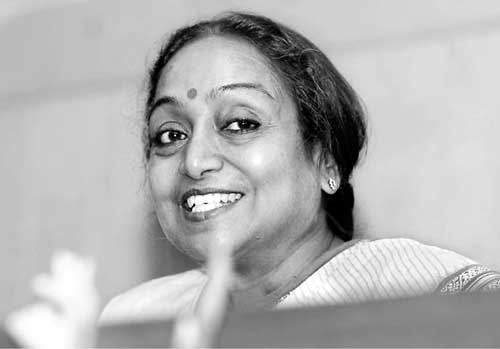Friday Feb 20, 2026
Friday Feb 20, 2026
Saturday, 24 June 2017 00:00 - - {{hitsCtrl.values.hits}}
For the first time in the history of Indian presidential elections, caste has been brought to the fore in the run up to the 17 July presidential poll, reflecting the nature of politics in the country now.
Both the ruling National Democratic Alliance (NDA) led by Prime Minister Narendra Modi’s Bharatiya Janata Party (BJP), and the opposition United People’s Progressive Alliance (UPA) led by Sonia Gandhi’s Congress party, have put up “Dalits”.
Dalits are a category of castes occupying the lowest rung in the Hindu social order, which in pre-independence days, was dubbed “untouchable” and discriminated against in myriad ways. Seventy years after independence, most Dalits are still at the bottom as hewers of wood and drawers of water, despite reservations or quotas in government jobs, educational institutions and elected bodies. 
While the BJP-led NDA has put up Ram Nath Kovind, the Congress-led UPA has put up Meira Kumar, both Dalits. Kovind is from the Koli caste, and Kumar is from the Jatav caste.
This is the first time that a Dalit is pitted against a Dalit in an Indian Presidential election. When K.R. Naranayan, a South Indian Dalit, was put up by the Congress as its candidate in the 1997 presidential election, the opposition put up T.N. Seshan, a South Indian Brahmin. At that time, it was a South Indian vs. South Indian. Caste was not matched by caste. But this time round, it is Dalit vs. Dalit.
Why Dalit?
The reasons are not far to seek. The BJP desperately needs to cultivate the Dalits, who have traditionally kept away from it, viewing it as a party of the Hindu upper and middle castes who are dead against any affirmative action in favor of the lower castes especially the Dalits.
If the BJP has some support among the Dalits now, it is primarily due to its electoral alliance with parties with a strong Dalit base. But the BJP has to have its own support base among the Dalits because electoral alliances are brittle, being marriages of convenience entered into for limited objectives. This is the reason for putting up a Dalit as the candidate now.
The BJP chose Govind also because of the “electoral saleability” of the Dalits in Indian elections. No Indian political party can dismiss a Dalit candidate offhand. The Dalits have political power because they are a solid vote bank. They are keen participants in the electoral process because they have a special place in the Indian constitution. They are the only caste group other than the tribals which has seats constitutionally reserved for it in elections. In this context no political party wants to be seen as being “anti-Dalit”.
The “Dalit factor” was a major reason why K.R. Narayanan won against T.N. Seshan in the 1997 presidential election, though Seshan had an awesome reputation as a fearless and honest civil servant who had rid the Indian electoral system of much of its corruption. Of course Narayanan was no small fry. He was a product of the London School of Economics and had been a member of the Indian Foreign Service.
Hindutwa factor
For the BJP, an additional advantage of having Kovind as the candidate is that he is a staunch believer in the ideology of the BJP, namely, “Hindutwa” or Hindu-based Indian nationalism. He was an early recruit to the Rashtriya Swayamsewak Sangh (RSS) which provides the BJP with an ideology and a hardcore cadre who are organised in a militaristic fashion.
In 2010, as a spokesman of the BJP, Kovind stoutly defended his party’s opposition to extending reservation in Government jobs to Dalits who had converted to Islam or Christianity. Like a true RSS man, Kovind dubbed Christianity and Islam as “non-Indian” religions. He also said that if reservations were extended to Dalit converts to Christianity and Islam, the Hindu Dalits would suffer.
He said Dalit Christians will walk into jobs because they would have gone to “English medium missionary-run schools”. As for Dalit Muslims, their lot is better because their religious cohorts don’t treat them as harshly as Hindu upper castes do.
All this would be music to the ears of the Hindu upper castes who form the bulk of BJP’s supporters. They would see him as “their man”.
Disciplined soldier
Reports say the BJP chose Kovind also because he is quintessentially a party man trained in the RSS tradition to obey the command of his superiors.
As a ceremonial president (India has the Westminster system in which the Head of State is a figurehead), Kovind will have little to do except to officiate at State functions. But he has residual powers under which he can send back to Parliament bills for reconsideration and also has the right to advice and warn the Prime Minister.
Narayanan was a quiet type, but had prevented unconstitutional dismissal of State governments. It remains to be seen if Kovind will be a rubber stamp and a disciplined soldier of the RSS, or will exercise the limited but critical power vested in him by the constitution.
No one-horse race
The 17 July presidential election is by no means a one-horse race as it was thought to be on the day Kovind’s candidature was announced. At that time, the Congress-led UPA was groping in the dark to get a consensus candidate.
With no party decisively dominant in the opposition alliance (in contrast to the NDA where the BJP has decisive dominance), discussions were meandering with parties putting up various names.
The Leftists were pressing for Gopal Krishna Gandhi, former High Commissioner of India in Sri Lanka, Governor of West Bengal and a grandson of Mahatma Gandhi. After the BJP came up with a Dalit, the UPA considered several Dalits and finally (pressed by Sonia Gandhi of the Congress), accepted Meira Kumar on the grounds that she is a doughty fighter, has a distinguished lineage, and has a fund of political and administrative experience.
As per the present line up, the BJP-NDA has 63.1% of the votes in the electoral college comprising elected members of Parliament and the provincial legislatures. But Kumar’s candidature could throw a spanner in the BJP’s works. Some in the BJP-NDA line up might switch sides on ideological grounds.
Ideological war
As Bihar stalwart Lalu Prasad Yadav put it, this is an ideological war.
“What is at issue here is not the merit of the candidates but their ideologies,” he said.
Congress Leader in the Upper House of Parliament (Rajya sabha) Gulam Nabi Azad said that the issue is social justice. “Meira Kumar is a vigorous campaigner for social justice.”